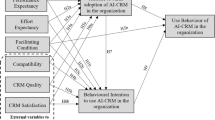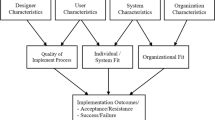Abstract
Artificial Intelligence (AI) integrated Customer Relationship Management (CRM) systems can maximize firms’ value by identifying and retaining best customers. The success of such advanced technologies depends on employee’s adoption. However, research on examining employee’s acceptance of AI integrated CRM systems is scarce. Therefore, this study has taken an attempt to propose conceptual model to predict the use-behaviour of employees to use AI integrated CRM system in organizations. This study adapted meta-UTAUT model as theoretical lens and extended the model with constructs such as compatibility, CRM quality, and CRM satisfaction specific to the organizational context. Future researchers can empirically test the proposed model with data gathered from employees using AI integrated CRM system.
Access this chapter
Tax calculation will be finalised at checkout
Purchases are for personal use only
Similar content being viewed by others
References
Kennedy, A.: Electronic customer relationship management (eCRM): opportunities and challenges in a digital world. Irish Mark. Rev. 18, 58 (2006)
Nguyen, B., Mutum, D.S.: A review of customer relationship management: successes, advances, pitfalls and futures. Bus. Process Manag. J. (2012)
Graca, S.S., Barry, J.M., Doney, P.M.: Performance outcomes of behavioural attributes in buyer-supplier relationships. J. Bus. Indust. Mark. (2015)
Li, M., Nguyen, B.: When will firms share information and collaborate to achieve innovation? The Bottom Line (2017)
Molinillo, S., Japutra, A.: Organizational adoption of digital information and technology: a theoretical review. The Bottom Line (2017)
Chatterjee, S., Ghosh, S.K., Chaudhuri, R., Nguyen, B.: Are CRM systems ready for AI integration? The Bottom Line (2019)
Laumer, S., Maier, C., Eckhardt, A., Weitzel, T.: Work routines as an object of resistance during information systems implementations: Theoretical foundation and empirical evidence. Eur. J. Inform. Syst. 25, 317–343 (2016)
IDC https://www.import.io/wp-content/uploads/2017/04/Seagate-WP-DataAge2025-March-2017.pdf
Ferraris, A., Santoro, G., Bresciani, S.: Open innovation in multinational companies’ subsidiaries: the role of internal and external knowledge. Eur. J. Int. Manag. 11, 452–468 (2017)
Heide, J.B., Wathne, K.H., Rokkan, A.I.: Interfirm monitoring, social contracts, and relationship outcomes. J. Mark. Res. 44, 425–433 (2007)
Verma, D., Verma, D.S.: Managing customer relationships through mobile CRM in organized retail outlets. Int. J. Eng. Trends Technol. 4, 1696–1701 (2013)
Chatterjee, S., Ghosh, S.K., Chaudhuri, R.: Knowledge management in improving business process: an interpretative framework for successful implementation of AI–CRM–KM system in organizations. Bus. Process Manag. J. (2020)
Peters, L.D., Pressey, A.D., Greenberg, P.: The impact of CRM 2.0 on customer insight. J. Bus. Indust. Mark. (2010)
Maxwell, A.L., Jeffrey, S.A., Lévesque, M.: Business angel early stage decision making. J. Bus. Ventur. 26, 212–225 (2011)
Vrontis, D., Thrassou, A., Santoro, G., Papa, A.: Ambidexterity, external knowledge and performance in knowledge-intensive firms. J. Technol. Transf. 42(2), 374–388 (2016). https://doi.org/10.1007/s10961-016-9502-7
Chatterjee, D., Dandona, B., Mitra, A., Giri, M.: Airbnb in India: comparison with hotels, and factors affecting purchase intentions. Int. J. Cult. Tourism Hosp. Res. (2019)
Venkatesh, V., Morris, M.G., Davis, G.B., Davis, F.D.: User acceptance of information technology: toward a unified view. MIS Q. 27, 425–478 (2003)
Dwivedi, Y.K., Rana, N.P., Jeyaraj, A., Clement, M., Williams, M.D.: Re-examining the unified theory of acceptance and use of technology (UTAUT): Towards a revised theoretical model. Inform. Syst. Front. 21, 719–734 (2019)
Venkatesh, V., Davis, F.D., Morris, M.G.: Dead or alive? The development, trajectory and future of technology adoption research. J. Assoc. Inform. Syst. 8, 267 (2007)
Tamilmani, K., Rana, N.P., Dwivedi, Y.K.: Mobile application adoption predictors: systematic review of UTAUT2 studies using weight analysis. In: Al-Sharhan, S.A., et al. (eds.) I3E 2018. LNCS, vol. 11195, pp. 1–12. Springer, Cham (2018). https://doi.org/10.1007/978-3-030-02131-3_1
Davis, F.D.: Perceived usefulness, perceived ease of use, and user acceptance of information technology. MIS Q. 319–340 (1989)
Cimperman, M., Brenčič, M.M., Trkman, P.: Analyzing older users’ home telehealth services acceptance behaviour—applying an extended UTAUT model. Int. J. Med. Informatics 90, 22–31 (2016)
Chauhan, S., Jaiswal, M.: Determinants of acceptance of ERP software training in business schools: empirical investigation using UTAUT model. Int. J. Manag. Educ. 14, 248–262 (2016)
Šumak, B., Šorgo, A.: The acceptance and use of interactive whiteboards among teachers: differences in UTAUT determinants between pre-and post-adopters. Comput. Hum. Behav. 64, 602–620 (2016)
Tamilmani, K., Rana, N.P., Alryalat, M.A.A., Al-Khowaiter, W.A., Dwivedi, Y.K.: Social media research in the context of emerging markets: an analysis of extant literature from information systems perspective. J. Adv. Manag. Res. 15, 115–129 (2018)
Sánchez-Prieto, J.C., Olmos-Migueláñez, S., García-Peñalvo, F.J.: Informal tools in formal contexts: Development of a model to assess the acceptance of mobile technologies among teachers. Comput. Hum. Behav. 55, 519–528 (2016)
Šumak, B., Pušnik, M., Heričko, M., Šorgo, A.: Differences between prospective, existing, and former users of interactive whiteboards on external factors affecting their adoption, usage and abandonment. Comput. Hum. Behav. 72, 733–756 (2017)
Tsai, Y.-Y., Chao, C.-M., Lin, H.-M., Cheng, B.-W.: Nursing staff intentions to continuously use a blended e-learning system from an integrative perspective. Qual. Quant. 52(6), 2495–2513 (2017). https://doi.org/10.1007/11135-017-0540-5
Tamilmani, K., Rana, N.P., Dwivedi, Y.K.: A systematic review of citations of UTAUT2 article and its usage trends. In: Kar, A.K., et al. (eds.) I3E 2017. LNCS, vol. 10595, pp. 38–49. Springer, Cham (2017). https://doi.org/10.1007/978-3-319-68557-1_5
Khalilzadeh, J., Ozturk, A.B., Bilgihan, A.: Security-related factors in extended UTAUT model for NFC based mobile payment in the restaurant industry. Comput. Hum. Behav. 70, 460–474 (2017)
Hoque, R., Sorwar, G.: Understanding factors influencing the adoption of mHealth by the elderly: an extension of the UTAUT model. Int. J. Med. Inform. 101, 75–84 (2017)
Chao, C.-M.: Factors determining the behavioural intention to use mobile learning: An application and extension of the UTAUT model. Front. Psychol. 10, 1652 (2019)
Van Raaij, E.M., Schepers, J.J.: The acceptance and use of a virtual learning environment in China. Comput. Educ. 50, 838–852 (2008)
Bagozzi, R.P.: The legacy of the technology acceptance model and a proposal for a paradigm shift. J. Assoc. Inform. Syst. 8, 3 (2007)
Li, J.: Blockchain technology adoption: examining the fundamental drivers. In: Proceedings of the 2020 2nd International Conference on Management Science and Industrial Engineering, pp. 253–260 (2020)
Lin, C.-P., Anol, B.: Learning online social support: an investigation of network information technology based on UTAUT. CyberPsychol. Behav. 11, 268–272 (2008)
Wang, Y.S., Wu, M.C., Wang, H.Y.: Investigating the determinants and age and gender differences in the acceptance of mobile learning. Br. J. Edu. Technol. 40, 92–118 (2009)
Wang, H.-Y., Wang, S.-H.: User acceptance of mobile internet based on the unified theory of acceptance and use of technology: Investigating the determinants and gender differences. Soc. Behav. Pers. Int. J. 38, 415–426 (2010)
Dwivedi, Y.K., Rana, N.P., Tamilmani, K., Raman, R.: A meta-analysis based modified unified theory of acceptance and use of technology (Meta-UTAUT): a review of emerging literature. Curr. Opin. Psychol. (2020)
Patil, P., Tamilmani, K., Rana, N.P., Raghavan, V.: Understanding consumer adoption of mobile payment in India: Extending Meta-UTAUT model with personal innovativeness, anxiety, trust, and grievance redressal. Int. J. Inf. Manage. 54, 102144 (2020)
Fishbein, M., Ajzen, I.: Belief, attitude, intention and behaviour: an introduction to theory and research (1975)
Wood, W.: Attitude change: persuasion and social influence. Ann. Rev. Psychol. 51, (2000)
Rogers, E.: Diffusion of Innovations. Free Press, New York (1995)
Wang, M., Cho, S., Denton, T.: The impact of personalization and compatibility with past experience on e-banking usage. Int. J. Bank Mark. (2017)
Battor, M., Battor, M.: The impact of customer relationship management capability on innovation and performance advantages: testing a mediated model. J. Mark. Manag. 26, 842–857 (2010)
Nyadzayo, M.W., Khajehzadeh, S.: The antecedents of customer loyalty: A moderated mediation model of customer relationship management quality and brand image. J. Retail. Consum. Serv. 30, 262–270 (2016)
Kalaignanam, K., Varadarajan, R.: Offshore outsourcing of customer relationship management: conceptual model and propositions. J. Acad. Mark. Sci. 40, 347–363 (2012)
Phan, D.D., Vogel, D.R.: A model of customer relationship management and business intelligence systems for catalogue and online retailers. Inf. Manag. 47, 69–77 (2010)
Winer, R.S.: A framework for customer relationship management. Calif. Manag. Rev. 43, 89–105 (2001)
Venkatesh, V., Thong, J.Y., Xu, X.: Unified theory of acceptance and use of technology: a synthesis and the road ahead. J. Assoc. Inform. Syst. 17, 328–376 (2016)
Karahanna, E., Agarwal, R., Angst, C.M.: Reconceptualizing compatibility beliefs in technology acceptance research. MIS Q. 781–804 (2006)
Oliveira, T., Thomas, M., Baptista, G., Campos, F.: Mobile payment: Understanding the determinants of customer adoption and intention to recommend the technology. Comput. Hum. Behav. 61, 404–414 (2016)
Slade, E.L., Dwivedi, Y.K., Piercy, N.C., Williams, M.D.: Modeling consumers’ adoption intentions of remote mobile payments in the United Kingdom: extending UTAUT with innovativeness, risk, and trust. Psychol. Mark. 32, 860–873 (2015)
Hair, J.F., Risher, J.J., Sarstedt, M., Ringle, C.M.: When to use and how to report the results of PLS-SEM. Eur. Bus. Rev. (2019)
Willaby, H.W., Costa, D.S., Burns, B.D., MacCann, C., Roberts, R.D.: Testing complex models with small sample sizes: A historical overview and empirical demonstration of what partial least squares (PLS) can offer differential psychology. Pers. Individ. Differ. 84, 73–78 (2015)
Hair Jr., J.F., Hult, G.T.M., Ringle, C., Sarstedt, M.: A Primer on Partial Least Squares Structural Equation Modeling (PLS-SEM). Sage Publications, Thousand Oaks (2016)
Hair, J.F., Sarstedt, M., Ringle, C.M., Mena, J.A.: An assessment of the use of partial least squares structural equation modeling in marketing research. J. Acad. Mark. Sci. 40, 414–433 (2012)
Whetten, D.A.: An examination of the interface between context and theory applied to the study of Chinese organizations. Manag. Organ. Rev. 5, 29–56 (2009)
Saumya, S., Singh, J.P., Baabdullah, A., Rana, N.P., Dwivedi, Y.K.: Ranking online consumer reviews. Electron. Commer. Res. Appl. 29, 78–89 (2018)
Kizgin, H., Jamal, A., Dey, B.L., Rana, N.P.: The impact of social media on consumers’ acculturation and purchase intentions. Inform. Syst. Front. 20(3), 503–514 (2017). https://doi.org/10.1007/s10796-017-9817-4
Rana, N.P., Dwivedi, Y.K.: Using clickers in a large business class: examining use behavior and satisfaction. J. Market. Educ. 38(1), 47–64 (2016)
Author information
Authors and Affiliations
Corresponding author
Editor information
Editors and Affiliations
Rights and permissions
Copyright information
© 2020 IFIP International Federation for Information Processing
About this paper
Cite this paper
Chatterjee, S., Tamilmani, K., Rana, N.P., Dwivedi, Y.K. (2020). Employees’ Acceptance of AI Integrated CRM System: Development of a Conceptual Model. In: Sharma, S.K., Dwivedi, Y.K., Metri, B., Rana, N.P. (eds) Re-imagining Diffusion and Adoption of Information Technology and Systems: A Continuing Conversation. TDIT 2020. IFIP Advances in Information and Communication Technology, vol 618. Springer, Cham. https://doi.org/10.1007/978-3-030-64861-9_59
Download citation
DOI: https://doi.org/10.1007/978-3-030-64861-9_59
Published:
Publisher Name: Springer, Cham
Print ISBN: 978-3-030-64860-2
Online ISBN: 978-3-030-64861-9
eBook Packages: Computer ScienceComputer Science (R0)





